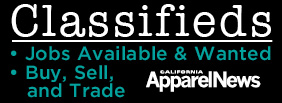Made in California, Part III: A Special Report
Third in a continuing series of apparel and accessory brands that are “making it” in California
Corey Lynn CalterSince her eponymous label’s inception, designer Corey Lynn Calter has produced close to 80 percent of her line in California using independent contractors. Her embellished groups and a small percentage of private-label pieces are made in China and India. Calter also sources materials in California as much as possible.
Advantages: “Of course, the ease of [manufacturing] being local is fantastic,” Calter says. “We are finding that price and the quality are becoming competitive with overseas production. We are loyal to good contractors, as they are to us. We produce a minimum of 90 percent of what is ordered; therefore, the volume is all over the place—anywhere from 20 pieces to 4,000 pieces. So we have contractors of all sizes, and we keep them busy year-round.”
www.coreylynncalter.comErgeLaunched in 2005 by designer Frank Quijada, Erge is a line of women’s and tweens’ tees dubbed as “luxury basics” with vibrant and subdued colors, graphic prints, and texture. Sold in more than 900 boutiques nationwide—as well as Neiman Marcus, Bloomingdale’s, Lord & Taylor, Macy’s and Von Maur department stores—Erge is produced entirely in-house in Los Angeles.
Advantages: “Quick turnaround, the ability to make samples overnight, identifying any production problems and correcting them quickly, as well as no shipping or freight charges,” Quijada says. “Production runs vary from 1,000 to 20,000 units. Sales totaled $1.1 million in 2007; $3.8 million is projected for 2008.”
www.ergedesigns.comFound DenimFound Denim has been produced in California since its Fall 2007 debut. Designers Lana Cretz and Sara Watson worked for Chip & Pepper, Hudson and Adriano Goldschmied before teaming up with artist and designer Steve Zeitzoff to launch Found. Notable retailers include Fred Segal Fun, Kate on Fairfax and Creatures of Comfort. In addition to four basic five-pocket styles, the label now offers denim fashion pieces and is also reoffering some styles in organic fabrics to be worn with the denim. Currently 100 percent of the line is produced in Los Angeles at Cal Stitch.
Advantages: Explains Cretz: “Most of the best and most-experienced denim-centric sewing contractors and wash houses are here. Our main label states ’made in California,’ and we feel consumers see that and know that the garment is made from premium materials and is expertly constructed. Quality is extremely important to us, and, by using local contractors, we’re able to oversee the progress of each garment’s production. We feel that by producing our garments locally we’re helping to stimulate the economy, and we can also have a clear conscience, knowing that our contractors are abiding by labor laws and adhering to a high standard of ethical conduct.”
www.founddenim.comHabitualRecently purchased by DenimXworks Inc., an affiliate of New Fashion Products, Habitual has been produced in Los Angeles since its inception in 2001.
Advantages: Says Chief Executive Officer Bobby Ahn: “It gives us significant creative and production control, which translates to a uniquely high-quality product. The expertise present here enables us to maintain creative integrity throughout the production process. There are few places in the world where a company can scale their production from a few units to tens of thousands weekly, thus making California the ideal place for companies who are looking to start or rapidly grow their business. The flexibility that comes from Los Angeles’ entrepreneurial manufacturing base enables us to be both progressive and reactive.
“In a global sense, price will always be a disadvantage, but we feel that the value added through innovation, flexibility and execution keeps us very much competitive. Another disadvantage, which may be more of a validation of California’s success than anything else, is the exporting of development and manufacturing talent to the rest of the world.”
www.habitual.comKeep MeMalibu, Calif.–based Ali Kay and Annes des Barres of Keep Me produce 100 percent of their line at an off-site, independent, family-owned contractor in Los Angeles. Launched last year, the well-edited line of luxe loungewear reflects the designers’ vision of creating a complete wardrobe for leisure life, from the yoga studio to the spa and the coffee shop. The line is evolving with the addition of new styles to supplement core basics. With the exception of organic cotton, which is sourced from a supplier in Montreal, all materials are sourced from California-based companies.
Advantages: Explains Kay: “The advantages are endless! There is nothing quite like being able to walk through our sample room, factory and/or warehouse to double-check that everything is running smoothly. The ability to make minor alterations mid-production, without catastrophic consequences, is another benefit. With fuel prices rising, domestic production is only going to become more and more attractive, so, whereas price is typically the overseas enticement, we are not at all enticed by overseas pricing. We are also thrilled to be able to support our local economy and all of the fantastic contractors and suppliers we work with here in California. The relationships we have with these people are definitely one of the most important aspects of our business and the way it is run and [are] equally important to us as individuals.
“For the first year, we will come very close to $300,000 in wholesale sales, which is roughly 10,000 units. We expect to double sales next year.”
www.keepme.com LA.madeSouthern California brand LA.made launched four years ago. For the first two years, 100 percent of production was handled at the in-house Los Angeles facilities, as the company moniker reflects. In the last two years, the line has expanded to include sweaters and wovens. Making up only 5 percent of the line, these pieces are produced overseas. For Fall 2008, LA.made also plans to introduce a children’s line.
Advantages: “The greatest advantage for us has been the ability to work closely to the market,” says principal Luis Fuentes. “Having all of our resources here enables us to react quickly to the trends and to then follow up with a fast turnaround on production. For us it has only been positive.”
www.lamade.netMaxine DillonDesigner Maxine Dillon launched her eponymous label for Spring 2008. Around 95 percent of production is done in downtown Los Angeles by independent contractors. Dillon also sources trims and fabrics in California. “The California Mart is an amazing resource,” Dillon says. “I always go to the textile show each season.” She also has custom prints made in New York and sources some fabrics from other countries, including Japan and Italy.
Advantages: “Producing overseas can require huge lead times,” Dillon explains. “This is one major advantage that young designers have over larger companies: We can cater to the ever-changing market and buyers’ needs. Producing downtown gives me the ability to manufacture any quantity, regardless of how big or small.”
www.maxinedillon.comRailsLaunched in Fall 2006, Rails is a contemporary label for men and women. Designer and owner Jeff Abrams says nearly 100 percent of the line is produced in Los Angeles by local contractors. The only items currently manufactured overseas are accessories, such as hats. Additionally, Rails supports the local economy by sourcing 75 percent of fabrics from local mills. For trims, hardware, labels and other adornments, the company typically buys from local distributors that import foreign goods.
Advantages: “We can take orders as late as six weeks before delivery and still make our factory date,” Abrams says. “We are also able to produce styles that may have smaller volume—styles we may otherwise drop from the line if they don’t hit overseas minimums. Lastly, there is the human connection with those you work with that gets lost when doing overseas production. After working with my contractors for two years, they are part of my business family.
“We pay a significant premium to produce our goods in California, but, because we are in the higher-end market, our margins allow for some of the extra cost. But as the economy tightens and retailers look for more cost-effective price points, manufacturers that produce in California may be forced overseas. But overseas production can take more than 12 weeks. Some majors we work with may order 4,000 units of a particular style, while other styles may only require 150 units. This year, we project more than a 200 percent growth in sales.”
www.railsclothing.comRiller and FountSusie Crippen, J Brand co-founder and creative director, teamed up with designer Marlena Ruiz to launch Riller and Fount in 2007. All production for the label is in California at an off-site independent contractor. Currently, the line is based on a single fabrication, which is also manufactured in California.
Advantages: “Manufacturing in California allows us to be hands-on on a daily basis from the first samples through production,” Ruiz says. “If necessary, this allows us to get new styles to market in approximately three weeks. For a contemporary price point, we see no disadvantages.
“Currently, we produce 5,000 units a month, and, by September 2008, we project that to increase to 12,000 units a month. Projected sales for 2008 are $4 million.”
www.rillerandfount.com Saffron Rare ThreadsSan Francisco designer Priya Saraswati launched Saffron Rare Threads in 2004. Originally focused on suiting, the line now comprises stylish, sophisticated separates and dresses. Since the line’s inception, independent contractors have handled 100 percent of production and manufacturing in San Francisco.
Advantages: “Short lead times—if something is selling well, I can reorder relatively quickly,” Saraswati says. “I also like working closely with my sample sewers during product development. The fact that I manufacture locally is a big selling point with my retail customers. [The only disadvantage is] cost—the limited options for manufacturing make it difficult to get competitive pricing.”


























